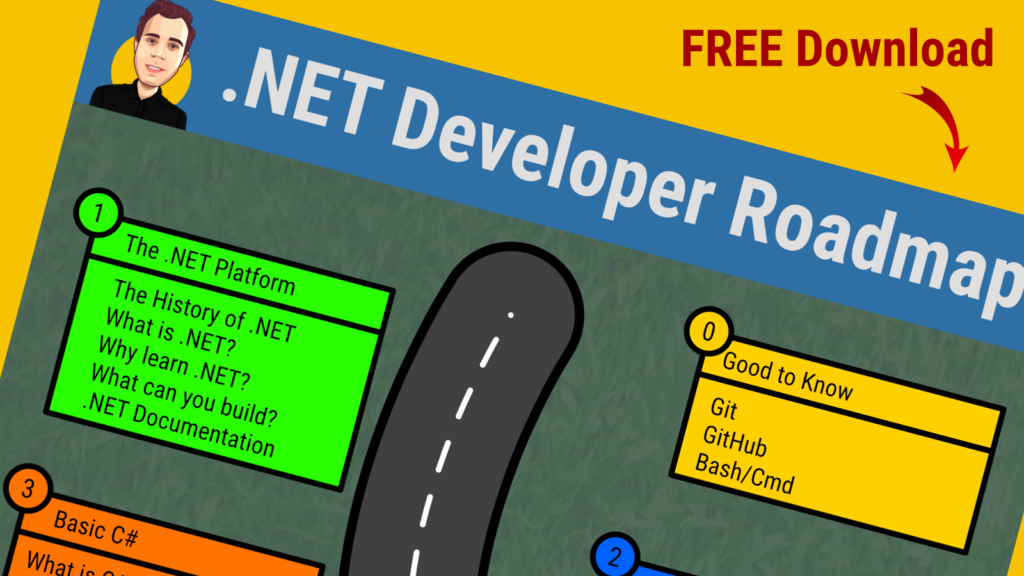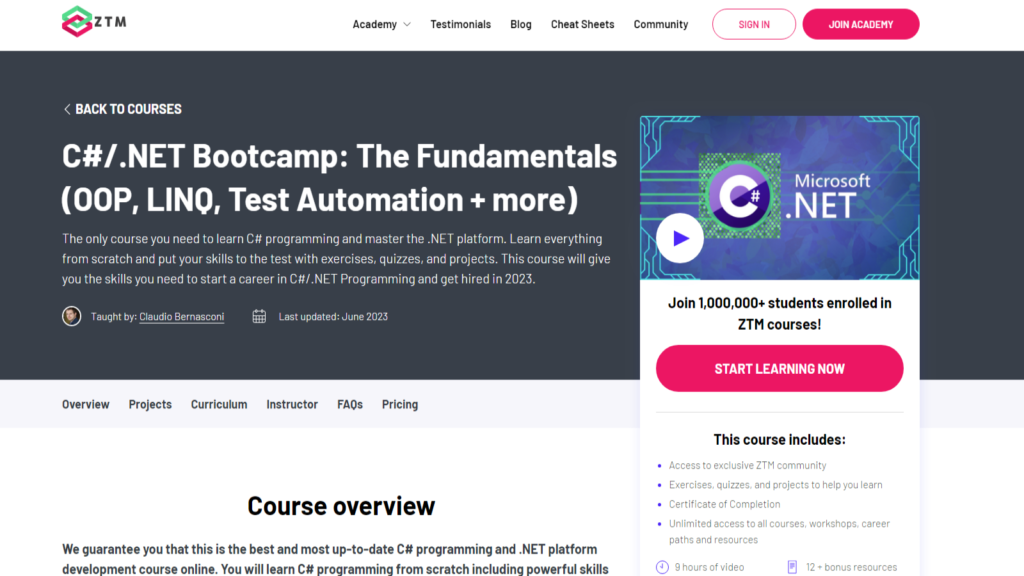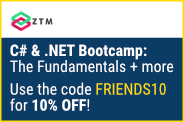Learning .NET and C# development is rewarding. You can build almost anything from console applications to web applications, mobile apps, and even games.
You can also build IoT solutions and cloud-native services. Or you can apply machine learning or implement AI applications using the .NET platform.
The best part is that if you learn the fundamentals, you can specialize in one or more areas of your choice and still use the foundations in your everyday work.
The more you use it, the more you learn about the platform. Transitioning between different types of applications becomes easier the more experience you gain.
This roadmap is built on my experience based on more than a decade of C# and .NET development and working more than 15 years in software development.
The Roadmap
You can download a high-resolution PDF of the .NET Developer Roadmap.
Module 0: Good to Know
When you start, there is much more than learning a programming language or a runtime. Learning about web protocols, data structures, algorithms, and much more is important for software development.
However, the goal of this roadmap is to focus on .NET and C# development. I put the topics in what I believe is the best order for developers new to the .NET platform.
There are no requirements for learning .NET development. If you are completely new to programming, you should still be able to follow along.
If you have experience in other platforms and languages, good for you.
The only thing that I believe is valuable to learn before diving into a specific programming language is Git and how to use a command line interface.
Git allows you to save your work and go back if you mess up. It’s helpful at the beginning when you will make mistakes.
Module 1: The .NET Platform
First of all, it’s important to understand how .NET works.
There are programming languages such as C#. A compiler turns the program code into a format that can be executed by the .NET runtime. The .NET runtime is either installed on the target computer or shipped with your application.
Also, .NET was first released in 2002. It’s been a long journey, and learning about the history of .NET makes it simpler to understand how everything works together. Terms such as .NET Framework, .NET Core, and just .NET become second nature to you.
Module 2: Setting up the Development Environment
I strongly believe that you learn best when you not only consume but actually build something. To build something, you need to set up your development environment.
You can develop .NET applications on macOS, Linux, and Windows. You can use the same programming language, but the tooling is probably different. It’s important to learn about the cross-platform story of .NET.
Module 3: Basic C#
What I call Basic C# is a pot of different things. First, I suggest writing the classic Hello World as a console program.
Generally, I’d learn all the basics about .NET and C# using console applications. They allow for fast feedback and have a low barrier to entry. You can write a simple Hello World .NET console application with a single line of code.
There is a lot to learn about the C# compiler, the fundamentals of console applications, and the programming fundamentals in C#.
Value Types, Strings, DateTime, different operators, conditional statements, iteration statements, and defining variables are what I count as Basic C#.
Module 4: Object-oriented Programming in C#
C# is an object-oriented programming language by heart. It also supports some functional programming elements and other programming paradigms. However, in the beginning, learning how object-oriented programming works in C# is important.
Terms such as classes, objects, reference types, methods, fields, properties, and constructors should become second nature after learning about object-oriented programming in C#.
There are additional topics on the roadmap that build a good foundation for understanding the core of object-oriented programming in C#.
Module 5: Intermediate C#
After learning about OOP, there are a few topics that do not necessarily connect well together but are all important to make the next step.
The var keyword is all over the place when looking at existing C# code. The same is true for the const keyword.
Enumerations and Structs are important data types. Also, understanding the difference between passing a reference type and a value type to a method is essential.
Exception Handling and Garbage Collection are two functions of the .NET runtime. It’s important to learn how they work and what you need to know as a C# developer.
Module 6: Arrays & Collections in C#
Arrays and Collection types are very important for building most application types. They store a group of objects in a specific way.
There are different collection types, and I suggest learning about the most commonly used types.
Module 7: Advanced C#
Advanced C# is what I would call a group of topics to learn after collection types.
Named and optional arguments, extension methods, the params keyword, and generic types are all somewhat related to each other. They allow for a more flexible code base.
Record Types are great when building data objects, and class libraries allow code sharing between different applications.
Module 8: Introduction to LINQ
Language Integrated Queries (LINQ) is a fundamental feature of C#. It allows querying data objects from different sources using a standardized API.
Filtering, Ordering, Selecting, and Grouping data using LINQ is important to learn. The LINQ Query syntax is also helpful to understand.
Module 9: Basic Testing in C#
When it comes to software development, automated testing has become a standard. It’s not possible and also not important to understand every single detail about test automation when you get started.
However, learning how to create a test project and implement unit tests using a testing framework are fundamental skills that I would expect from a junior developer in 2023.
What’s Next? It’s up to you!
After following the roadmap step-by-step, you will have a solid foundation for .NET and C# development. You can implement C# code, build class libraries, and console applications. That knowledge level is enough to fill a junior .NET developer role.
There is so much more to explore. You are ready to tackle web development using ASP.NET Core, mobile development using Xamarin or .NET MAUI, game development using Unity, and much more. Or you can learn F# as a second .NET programming language.
The .NET world is open to you.
You can get a high-resolution PDF of the roadmap for future reference.
Free Resources
I’ll be completely honest with you. Nowadays, you can learn almost everything for free on the Internet. There are YouTube videos, and there are blogs, guides, tutorials, and much more.
The availability of information is not an issue when learning about software development.
The difference between free and paid resources is usually how well they are prepared and produced. It affects how much time you will spend learning a topic until you fully understand it.
Free resources often take you hours, if not days, to complete the curriculum. They are efficiently created, but they are not efficient to consume.
Also, when using multiple resources, repetition is common. If you’re watching on YouTube, you’re also constantly watching ads instead of learning .NET development.
My C# & .NET Bootcamp on Zero to Mastery
Most paid options have a community that helps you stay on track and keeps you motivated. You connect with fellow learners.
Also, there are no ads or anything else distracting you from learning. It helps you stay focused on learning about .NET development.
Teaching software development, especially C# and .NET is a huge passion for me. It’s the reason I created a YouTube channel almost five years ago. However, I can only spend limited time creating free videos.
That’s why I created my .NET development course on Zero to Mastery.
Zero to Mastery is a coding academy with a broad selection of development-related courses by hand-picked industry expert instructors.
My course follows exactly the roadmap highlighted here. It saves you a lot of time learning .NET development and provides exercises, quizzes, and projects to apply what you have learned. Learn more about it on Zero to Mastery.
Full transparency: If you sign-up through my link, I’ll earn a small commission. However, I would only recommend a service I trust and am 100% convinced is a great product. I have spent over 400 hours creating my course for Zero to Mastery. I wouldn’t do that if I weren’t happy with their platform and didn’t trust the people behind it.
As a gift to my community, I offer the code FRIENDS10. If you sign-up using the FRIENDS10 code, you’ll get 10% off forever.
I wish you all the best on your .NET development journey, and I’d love to be your instructor at Zero to Mastery.




